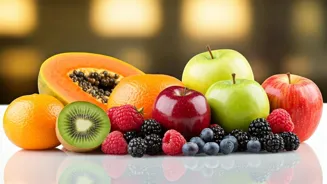Fruit Power For Gut
Fruits are packed with essential nutrients that contribute significantly to our digestive health. Fiber, in particular, is a key player in this process,
aiding in the smooth movement of food through the digestive tract and preventing constipation. Many fruits also contain natural enzymes that assist in breaking down food, making digestion more efficient. Additionally, fruits provide hydration, which is vital for all bodily functions, including digestion. The vitamins and antioxidants present in various fruits help reduce inflammation in the gut and protect against cell damage. Regular consumption of fruits is, therefore, linked to improved nutrient absorption, a balanced gut microbiome, and a reduced risk of digestive disorders. Including a variety of fruits in your diet ensures you're getting a wide array of beneficial compounds, supporting your overall health and well-being. Fruits are not only delicious but also a natural, readily available solution to enhance digestive health.
Apples: Fiber-Rich Friend
Apples are an excellent source of dietary fiber, particularly soluble fiber, which plays a crucial role in digestive health. Soluble fiber absorbs water, forming a gel-like substance that helps to soften stools and promote regular bowel movements, thereby preventing constipation. The fiber in apples also aids in regulating blood sugar levels and can contribute to feeling fuller for longer periods, which can assist with weight management. Apples are also rich in pectin, a type of soluble fiber known to feed beneficial gut bacteria. These bacteria produce short-chain fatty acids, which support colon health and reduce inflammation. The antioxidants in apples also help protect the digestive tract from damage. For maximum benefits, it is recommended to eat apples with the skin, as it contains a significant amount of fiber. Regular consumption of apples can improve overall digestive function and contribute to a healthier gut microbiome.
Bananas: Gentle Relief
Bananas are easily digestible and gentle on the stomach, making them a great choice for people experiencing digestive issues. They are a good source of fiber, which aids in bowel regularity and can help relieve both constipation and diarrhea. The soluble fiber in bananas absorbs water, adding bulk to stools and making them easier to pass. The potassium content in bananas helps regulate fluid balance, which is crucial for proper digestion. Bananas also contain resistant starch, which acts as a prebiotic, feeding beneficial bacteria in the gut and promoting a healthy microbiome. The natural sugars in bananas provide energy without causing significant spikes in blood sugar levels, making them a suitable option for people with sensitive stomachs. Bananas are versatile and can be easily incorporated into various diets, contributing to improved digestive comfort and overall gut health. They are a convenient and nutritious option for supporting a balanced digestive system.
Papayas: Digestive Enzymes
Papayas are renowned for their digestive enzymes, especially papain, which helps break down proteins and ease digestion. Papain can aid in relieving symptoms of indigestion, bloating, and heartburn. Papayas also have a high fiber content, supporting bowel regularity and preventing constipation. The enzymes in papayas not only help with digestion but also reduce inflammation in the gut. Papayas are rich in vitamins A and C, which boost immunity and protect the digestive tract from damage. Their high water content also helps keep the body hydrated, further aiding digestion. Eating papayas regularly can improve nutrient absorption and promote a healthier gut environment. The fruit's natural sweetness and refreshing taste make it a pleasant addition to the diet, offering both health benefits and a delicious culinary experience. Incorporating papayas into your daily routine can significantly enhance digestive comfort and overall well-being.
Kiwi: Gut-Friendly Benefits
Kiwis are excellent for improving digestive health due to their high fiber content and enzymes like actinidin. Actinidin helps break down proteins, aiding in digestion and reducing bloating. Kiwis are rich in both soluble and insoluble fiber, promoting regular bowel movements and relieving constipation. The fiber also supports the growth of beneficial gut bacteria, contributing to a balanced microbiome. Kiwis are packed with vitamins C and K, as well as antioxidants, which protect the digestive tract from inflammation and damage. The combination of fiber, enzymes, and nutrients makes kiwis a powerful ally for digestive health. Studies have shown that regular consumption of kiwis can improve bowel function, reduce symptoms of irritable bowel syndrome, and increase the diversity of gut bacteria. Kiwis are a delicious and easy-to-eat fruit that can significantly enhance digestive comfort and overall gut health. Their unique nutritional profile makes them a valuable addition to any diet focused on digestive wellness.
Pineapple: Bromelain Power
Pineapple contains bromelain, an enzyme that aids in protein digestion and reduces inflammation. Bromelain can alleviate symptoms of indigestion, bloating, and gas. Pineapples are also rich in fiber, which promotes regular bowel movements and prevents constipation. The high water content in pineapples helps keep the body hydrated, which is essential for proper digestion. Additionally, pineapples provide vitamins and antioxidants that support overall gut health. Bromelain can also reduce inflammation in the gut, contributing to a healthier digestive environment. Eating pineapples regularly can improve nutrient absorption and support a balanced gut microbiome. The tropical flavor and versatility of pineapples make them a refreshing and beneficial addition to your diet. Incorporating pineapples into your meals or snacks can enhance digestive comfort and promote overall wellness.
Pears: Another Fiber Source
Pears are an excellent source of dietary fiber, supporting healthy digestion and regular bowel movements. The fiber in pears, both soluble and insoluble, helps regulate digestion and can alleviate constipation. Pears also contain fructose, which, in moderation, can act as a natural laxative, promoting bowel regularity. They are also rich in antioxidants, which protect the digestive tract from inflammation. Pears have a high water content, aiding in hydration, which is crucial for efficient digestion. The fiber content also contributes to feeling fuller, which can help manage weight. Pears are gentle on the stomach and suitable for people with sensitive digestive systems. Eating pears regularly can improve overall gut health, prevent digestive discomfort, and contribute to a balanced microbiome. Their mild and sweet flavor makes them a versatile and enjoyable addition to various diets, supporting a healthy digestive system.
Berries: Antioxidant Boost
Berries, including blueberries, raspberries, and strawberries, are packed with fiber and antioxidants that support digestive health. Fiber helps regulate bowel movements, preventing constipation. The antioxidants in berries combat inflammation and protect the digestive tract from damage. Berries are also rich in vitamins and minerals, supporting overall gut health and reducing the risk of digestive issues. Their high water content aids in hydration, essential for proper digestion. The fiber content in berries promotes a feeling of fullness, assisting in weight management. Berries also provide prebiotics, which feed beneficial gut bacteria, contributing to a healthy microbiome. Eating berries regularly can enhance digestive comfort, improve nutrient absorption, and contribute to a balanced digestive system. Their delicious taste and versatility make them an enjoyable addition to your daily diet, promoting both health and well-being.
Oranges: Vitamin C Power
Oranges are a great source of vitamin C and fiber, supporting digestive health and overall well-being. The fiber in oranges promotes regular bowel movements and prevents constipation. Vitamin C acts as an antioxidant, protecting the digestive tract from damage and reducing inflammation. The high water content in oranges aids in hydration, which is crucial for efficient digestion. Oranges also contain various nutrients that support overall gut health and improve nutrient absorption. Eating oranges regularly can enhance digestive comfort, improve the function of the digestive system, and contribute to a balanced microbiome. The refreshing taste and ease of consumption make oranges a convenient and healthy addition to your diet, providing both essential nutrients and promoting digestive wellness.
Grapes: Gentle Digestion Aid
Grapes are a source of fiber and antioxidants, contributing to good digestive health and overall wellness. The fiber in grapes aids in regular bowel movements and prevents constipation. They contain antioxidants that help protect the digestive tract from inflammation and cell damage. Grapes also provide hydration due to their high water content, supporting efficient digestion. They are packed with various nutrients that can boost gut health and nutrient absorption. Eating grapes regularly can improve digestive comfort and improve gut function. The sweetness and delicious flavor make them a pleasant addition to your daily diet, offering both taste and health benefits. Their ability to be easily consumed makes them a convenient choice for promoting healthy digestion and well-being.




















